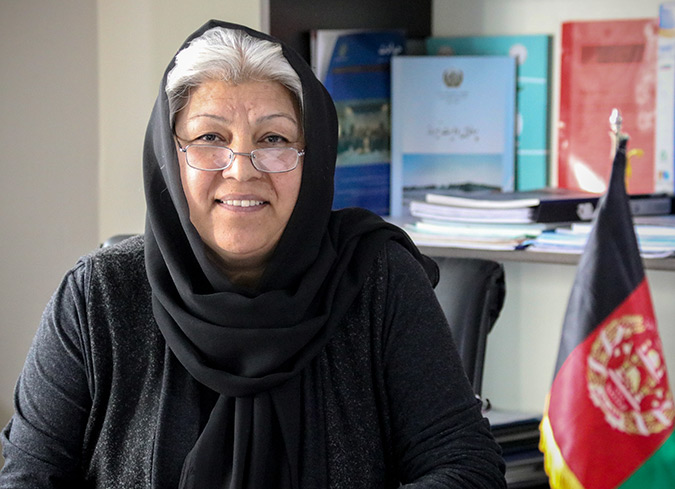“I needed to learn to lead myself before I could lead others” — an Afghan women’s rights leader talks about UN Women’s leadership training
Date:
Author: Nangyalai Tanai
Shukuria Hashimi has been with the Afghan National Disaster Management Authority (ANDMA) for 17 years, where she was appointed planning and policy manager in 2013, and recently started mentoring women graduate recruits. She is also the founder of the country’s Association of Women in Public Service. Hashimi shared her thoughts about a training course by UN Women she attended, on Transformational Leadership and Management for Women in the Afghan Civil Service.

“In Afghanistan, women in leadership positions have reached a pivotal point. Today, there are more women in positions of power than ever before. Women represent almost 28 per cent of Afghanistan’s parliament. There are three women ministers and six deputy ministers. But despite these achievements, Afghan women have not been able to unleash their full potential due to perceptions and social conditioning. There is the need to strengthen women’s presence in public service in two fronts: reinforce the sense that it is normal and natural for women to work as civil servant; and empower women to compete and progress to higher positions. We must not be content with a mandatory gender quota for women, or the 5 extra marks given to women candidates competing for civil service positions in Afghanistan.
In 2015, I founded the Association of Women in Public Service (AWPS) also supported by the government’s Independent Administration Reform and Civil Service Commission. The Association has a leadership board of seven women, as well as six committees. Through the AWPS, we advocate for strengthening women’s role in decision-making, speaking with ministers and heads of agencies to ensure that women benefit from learning and capacity development opportunities and enjoy the rights and incentives equally. We also help women in public service gain access to complaint mechanisms and ensure their complaints are addressed.
As I was progressing along my career, many questions were created in my mind to which I was constantly seeking answers. Am I really a leader? What are my habits as a leader? What impact can I have on others? How can I help others become leaders, and in turn, inspire future generations?
The Transformational Leadership and Management training for Women in Afghan Civil Service I received from UN Women helped me grow personally and professionally. I realized that I should learn to lead myself before I lead others. Today, I feel more confident and look at the challenges from a different perspective. I acquired essential skills and techniques to inspire team work. Since our work at ANDMA involves joint working with other ministries and international organizations, this is vital for us to join forces to help people affected by natural disasters. I have learned new ways to work with communities in the field and foster social responsibility in helping the affected. Had I acquired such skills and techniques before, I would have accomplished things differently when I was a senior surveyor and travelled to 21 provinces, 201 districts and more than 1000 villages.
Now that I possess the skills to be a leader, I am ready to transfer them to other women. Upon the completion of the Transformation Leadership Training, my office gave me the responsibility to mentor fresh graduates. I work with interns not just to expose them to the work of ANDMA but also to help them find a higher level of motivation. I have so far mentored 10 fresh graduates, all women, in the fields of planning and policy, and human resources.
Each time I meet with women, I create a new group of change agents. I tell them: ‘If you re-organize the way you do things, you will certainly open a new horizon to progress and prosper’.” Hashimi attended the training on Transformational Leadership and Management for Women in Afghan Civil Service held 22-28 October 2017 in Mazar-e Sharif, Balkh Province. The modules included executive presence, which helped participants to develop and strengthen their verbal and non-verbal communication, active listening skills, and understanding how to communicate to various audiences. Another module was social protocol and diplomatic etiquette, through which participants learned how to sell themselves and act in both formal and informal settings. Other topics comprised public speaking, emotional intelligence, leader versus manager, and building self-worth and confidence. The modules all together helped participants to learn practical skills to connect with each other, define goals and objectives, think big and have self-confidence.